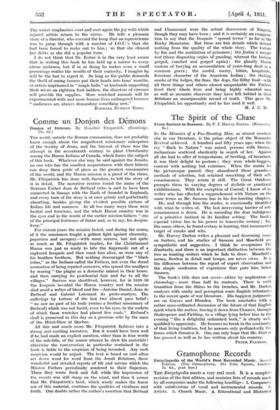The Spirit of the Chase
From Surtees to Sassoon. By F. J. Harvey Darton. (Kennerley 6s.)
IN the Memoirs of a Fox-Hunting Man, as almost nowhere else in our literature, is the prime object of the Romantic Revival achieved. A hundred and fifty years ago, when the cry " Back to Nature " was raised, persons with literary. inclinations scattered obediently in search of her. Against all she had to offer of tempestuous, of beetling, of luxuriant, it was their delight to posture ; they were whole-hoggerh, content with nothing but extremes. When the mania foe the picturesque passed, they abandoned these grandio,e methods of selection, but retained something of their self- consciousness. They retain it still. The Great Outdoor.; prompts them to varying degrees of stylistic or emotional exhibitionism. With the exception of Conrad, I know of no writer who has effected a rapprochement with Nature on the same terms as Mr. Sassoon has in his fox-hunting chapters.
He, and through him the reader, is emotionally identified with what he writes of. The last intervening barrier of self- consciousness is down. He is recording the dear indulgence of a primitive instinct in its familiar setting. The book's especial virtue lies in his power to transcribe ecstasy ; for, like many others, he found ecstasy in hunting, that immemorial target of cranks and wits.
Mr. Harvey Darton writes a pleasant and discerning essay on Surtees, and his studies of Sassoon and Masefield arc sympathetic and suggestive. I think he overpraises The Hawbucks, and there is an important distinction between the two as hunting writers which he fails to draw. Masefield', scenes, flawless in detail and tempo, are never virus. It is the difference between the report of expert observation and the simple confession of experience that puts •him below Sassoon.
The book's title does not cover—either by implication or chronology—more than half its contents. There is swift transition from the Shires to the trenches, and Mr. Darton analyses with sanity and perception some English tributaries to the recent spate of war literature. His happiest judgment, are on Graves and Blunden. The book concludes with a rather unto-ordinated discussion of the future of that English spirit which the author, tracing it down from Chaucer, through Shakespeare and Fielding, to a village lying below him in the evening " like a delightful unfinished book," is clearly well- qualified to appreciate. He foresees no break in the continuity of that living tradition, but he assesses only perfunctorily the forces which threaten it. One can only hope that Mr. Darton has guessed as well as he has written about his country.
PETER FLEXING.








































 Previous page
Previous page